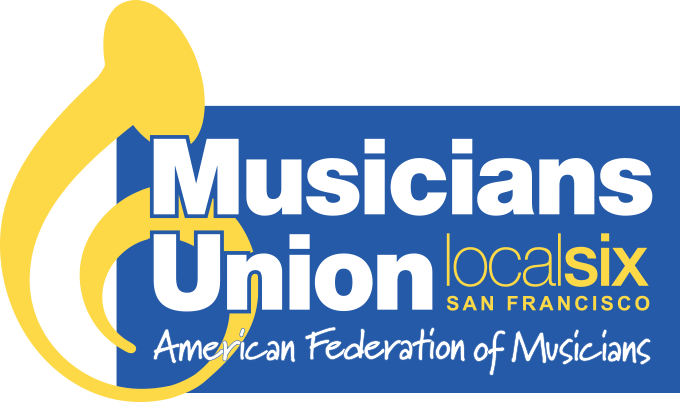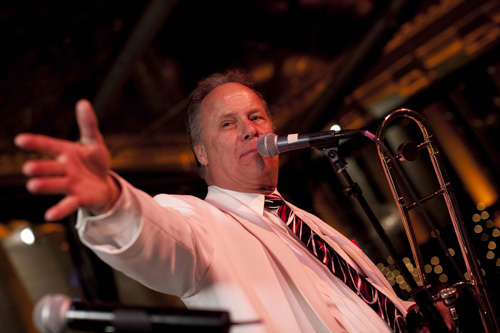
“As a performer, standing in front of a fourteen-piece orchestra and having it wash over you, under you, around you, and through you is the biggest thrill in the world.” Rex at the SF Palace of the Legion Of Honor, 2012.
Rex Allen is a trombonist, vibraphonist, drummer, Big Band leader, radio personality, voice-over artist, and media consultant. He recently became a Life Member of Local 6 and celebrated 40 years leading the Rex Allen Big Band and the Rex Allen Swing Express.
Rex Allen was born in Pittsburgh, PA, in 1952. His father, an executive in the aircraft maintenance industry, was assigned to the Bay Area in 1956. For a short period, Rex, his younger sister, and parents, lived at the Lake Merritt Hotel in Oakland where Rex remembers hearing the Larry Cappelli Orchestra every night. He was transfixed.
The Allen family eventually settled in San Leandro. Growing up, Rex spent countless hours listening to his parent’s record collection. “By design or accident, my father bought the best records for someone who is just learning jazz–Louis Armstrong, Duke Ellington, Jack Teagarden, Benny Goodman–I’ve heard that music since I was three years old.”
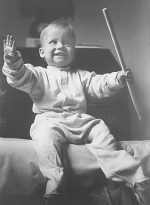
Already leading the band! Rex at one year old.
At the age of 10, Rex became obsessed with the drums when his father, an amateur drummer, pulled out his sticks and gave Rex his first lesson. That same year, when they were handing out band instruments at school, Rex picked the trombone. “The real reason I wanted to play the trombone was I loved the arm action of the Lawrence Welk television show trombone section. Four guys all doing the slide with one arm.”
Rex knew he was going to be a musician, but he wasn’t sure if he would be a drummer or a trombone player. He also had visions of leading his own Big Band. Rex loved Big Band music so much that he decided to stop listening to Rock and Roll. “At the age of 14 I was listening to rock stations KFRC, KYA, and I remember definitively on a day in June of 1966 saying to myself, ‘I’m tired of Rock and Roll. I’m not getting much out of it.’ I made a conscious decision to start listening really seriously to jazz and let jazz wash over me.”
Rex joined the New Orleans Jazz Club of Northern California and the Sacramento Traditional Jazz Society. The two organizations put together monthly jam sessions for professionals and amateurs which gave Rex the opportunity to meet some of the big names in the business who were still playing. In later years, Rex went on to work for some of these musicians, and many of them worked for him. Through these associations Rex played his first professional gig at age 15, a pajama party for the Grass Valley California Fire Department.
In 1968, Rex joined Local 510 in San Leandro. After high school he went to San Jose State where he lived at home and commuted. His parents were very supportive of his music career, but told him he had to have a back-up plan. “My back-up plan was radio/TV news, and journalism. I thought it would be a good career in case music didn’t pan out.” In school, Rex studied hard and performed as much as he could. His music appreciation teacher, Dwight Cannon, even told Rex that he should teach the class because he knew more about jazz than him.
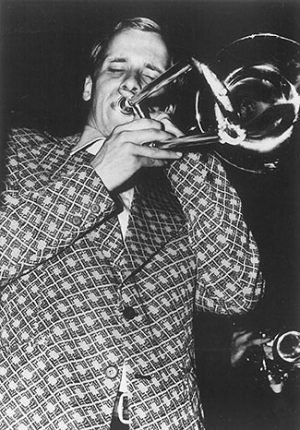
Bimbo’s Club, 1974. “I wasn’t interested in modern Jazz. My style of Jazz is what we call Dixieland or Vintage Jazz, going back to the 1920s, 30s, and 40s. What I have always done, and wanted to do from the very beginning, was perform commercial Swing music, the kind that made it the top popular music from about 1935-45, which most experts agree is the 10-year period of Big Bands.”
By the early 70s, Rex was beginning to make a name for himself. With the help of Local 6 legend Vernon Alley, he transferred to Local 6 in 1972 and immersed himself in the scene. “The casual scene was thriving at this time. If you wanted to work five to seven nights a week playing private parties in all the major hotels, you’d have it, hands down. There really was no problem getting work because the marketplace demanded that.”
The following year, Rex got a call from Jimmy Diamond, the bandleader in the New Orleans Room in the Fairmont Hotel, to be the off-night trombone player and regular sub. “I was just a kid, wet behind the ears, still learning the tunes. The result of the Fairmont connection was very important to me. I learned how to play with top level guys who really knew how to play Dixieland and Swing. Thanks to this band I met the truly great jazz players in San Francisco, and it was from this group of musicians that I started to form my own band.”
After college, Rex lived at home and continued to gig as much as he could. In 1975, his life took a fateful turn when he met and fell in love with the famous Swing singer, Connie Haines.
CONNIE HAINES
Rex recalls that in 1940, Connie Haines and Frank Sinatra were voted the number one boy and girl singer in the United States by Downbeat Magazine. They both starred in Tommy Dorsey’s orchestra, and they both went on to successful careers of their own. Connie Haines headlined every room around the world for about 25 years. She eventually left the business and became an ordained minister in Sacramento. “Coincidentally, I was playing a session at the Sacramento Traditional Jazz Society where she happened to be the guest artist. She was 55, I was 23. After the show I walked over to her and went down on my knee to ask her a question. When our eyes met it was like a lightning bolt. We fell in love just like that.”
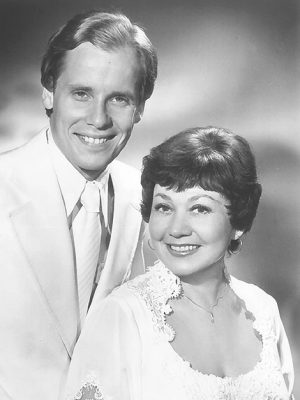
Rex and Connie Haines, late 70s.
Rex says his parents couldn’t believe it, the musicians he worked with couldn’t believe it, and her friends couldn’t believe it. “It was way out of the box, but I’ve got to tell you, it was really great on many levels, for both of us.”
For the next few years, along with working fulltime as the solo trombonist with the New Tommy Dorsey Orchestra, Rex became Connie Haines’ musical director and contractor. “She wanted to get back into the business, and I wanted to progress in the business, so it was a win-win for both of us.” Rex booked gigs and hired musicians for her in San Francisco clubs, and they went on several concert tours for Columbia Artists around the United States. The couple became a hot item in San Francisco newspapers.
During this time Rex toured nationally as trombonist with Yank Lawson and Bob Haggart’s World’s Greatest Jazz Band and became a member of the Bob Crosby Bob Cats. “It was a thrill working with my idols!”
RIDING THE WAVES
Over the past 50 years, there have been three waves of nostalgia for Big Band music. Rex explains:
“The first wave happened in 1968, thanks to a book called The Big Bands by George T. Simon, a highly respected New York jazz critic. This book swept the nation and it established the first ever nostalgia wave for the music industry.
Up until that time, nobody in the music industry had thought about nostalgia as a bankable product. Looking at the demographics, they could see that by the late 1940s people who had listened to Big Bands in their youth were too busy raising families and working to buy records or tickets. Thirty years later, when those original listeners retired, or their kids flew the coop, they wanted to go back and recreate the music that animated their teenage years. This is what nostalgia waves are based on.
This first Big Band nostalgia wave lasted about 10 years. Then in 1989 and into the early 90s, there was a second wave, largely due to the success of Harry Connick Jr. and how Sony Music promoted him. To some extent in this biz, I and others continued to ride on that success.
The third wave happened in the late 1990s and 2000s. The unfortunate thing about this last wave of nostalgia is that it largely was not about the music or stylistic interpretation of the Big Band era. It was about people dressing to create atmospherics around their shows. A lot of us laughingly called it ‘costume jazz’. There is currently no nostalgia wave for Big Bands that I’m aware of .”
A DREAM COME TRUE
In the late 70s, Rex became the co-leader of his own Big Band, The Rex Allen/Bob Neighbor Big Band. After college, Rex had become a member of a rehearsal band in Berkeley run by trumpet player Bob Neighbor. When Bob asked him to be a co-leader, Rex was thrilled, but soon realized it would be easier to turn the rehearsal band into a real working band. Things quickly progressed and he thought, “Why am I wasting my time calling everyone and trying to get subs for guys who can’t make it? Why not have all the rehearsals on the buyer’s dime? And why waste time rehearsing? Just call the best guys and get paid to do the gig.”
By the early 1980s, demand for Big Bands was momentarily fading. To fill in the gap Rex formed the Rex Allen Swing Express, a five-piece group for smaller bookings, giving him flexibility to handle any booking situation.
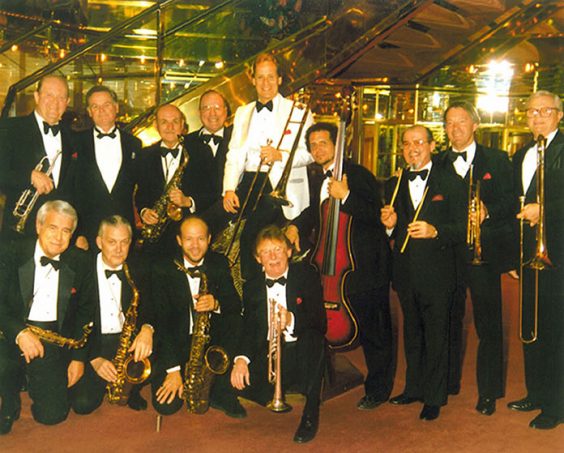
The Rex Allen Big Band going through the Panama Canal while headlining on a cruise ship in the 90s: “Everybody said, ‘Big Bands are dead, there’s no future. You don’t want to do this.’ Well, guess what? They were wrong.”
In 1983, Rex moved to Los Angeles to be with Connie Haines. He joined Local 47 and produced a few high profile shows with Connie, including a memorable night where he hired four of the original five saxophone players from the Glenn Miller band, and the fifth from the Harry James Orchestra. But after nine months, they both accepted that their romance had run its course. Having had a hard time breaking in to the LA scene, Rex returned to San Francisco. “LA was in a big transition. The jazz scene was weakening, and like a lot of cities, the music scene was very ingrown. It was very hard for me to break in, even with all the connections I had through Connie and the old big band guys I knew.”
Back in the Bay Area, Rex picked up where he left off. He played many casual and corporate gigs, cruises, and was asked to lead the new Gene Krupa Orchestra starring drummer Dave Black, a job which lasted for six years. He continued to play with Bob Crosby’s Bob Cats, and became Bob’s contractor for Northern California. Rex also contracted for Tony Bennett when he was in town.
In 1985, when Bob Neighbor decided to step down as co-leader of the Rex Allen/Bob Neighbor Big Band, Rex took over fulltime managing duties. The Rex Allen Big Band was born.
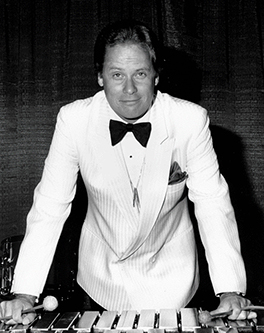 ON BEING A LEADER
ON BEING A LEADER
“When you’re on the bandstand, working minute to minute, you have several constituencies to manage simultaneously. First is the client, whether it’s the club owner, the mother of the bride, or whoever’s writing the check, they’re somewhere in that audience monitoring what you’re doing. Next, it’s the audience themselves. Then there’s the staff. You want to have a good relationship with the bartenders and waitstaff, if it’s that kind of situation, because they can make or break you if it’s a steady job. The most important constituency is the band, because those other constituencies might change next week. It took me years to weed out guys who didn’t get along with me, or visa-versa, or guys who were great readers but couldn’t play jazz, or guys who were good jazz players and knew the style I wanted, but couldn’t read well enough. So, you’re a manager not just a bandleader. But once you’ve got it running, a big band is like a fine Swiss watch. I love it.”
* * *
KEEPING IT FRESH
In the late 80s, The Rex Allen Swing Express found success with steady weekend engagements. They worked at the Hyatt Oakland Airport for 4 years, and then the Hyatt Burlingame for 3 years. From 1990 – 93 they were at the Claremont Hotel.
“All steady jobs have a shelf life. You can get burned out. You end up saying the same things on the mic because you can’t think of anything new. You end up programming only the best stuff, because the best stuff works. The best tunes, the best variation of tempos through a set–this is a trap that happens in show biz. It’s hard to break, because it works. It’s an artistic dilemma”
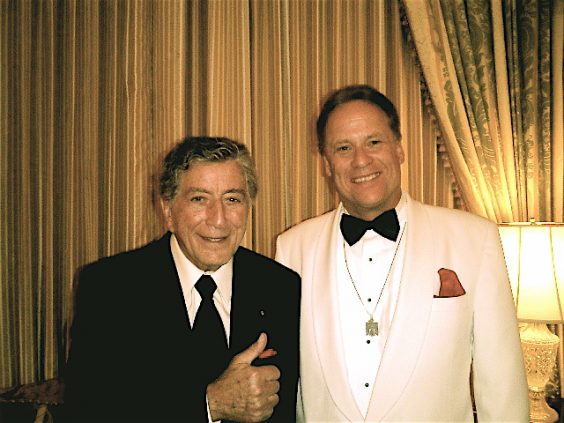
“Tony Bennet told me you have to reinvent yourself. He’s right and he did it, he reinvented his act. He didn’t become a Rock ‘n Roll singer, but he did things like the duets, which Frank Sinatra first did. In the 70s he got away from the big string orchestras and played jazz festivals with a small jazz group very successfully. When I booked Tony here in San Francisco, he had a quartet, piano, bass, drums, and guitar. He kind of went with the times. He became an elder statesman. He said it wasn’t a complete reinvention, but a ‘subtle evolution in packaging’. That’s the way he described it to me.”
Rex says he mixes things up by showcasing different players more as opposed to the band, and visa versa. “I’m very reluctant to change too much because I know the formula that I’ve had for 40 years truly does work.”
In 1993, Rex was the leader/emcee of a 75-city national tour for Columbia Artists’ A Salute to Glenn Miller. The tour played before 160,000 Swing fans, and included The Modernaires, Dick Haymes Jr, and Beryl Davis. “Every single night, we opened with Glenn Miller’s saxophone tune Moonlight Serenade. The voicing on that saxophone section will give you chills. I never got tired of that, not for a second.”
That same year, he was invited to Vilnius, Lithuania as one of four media consultants performing a week-long seminar advising the new government (then just free from the Soviet Union) on how to hold press conferences. “We taught them how to field questions (including follow-ups), be accountable and to manage and disseminate information, instead of handing out authoritarian propaganda statements. While there were attempts to brighten the stores and streets with color and lights, the gray pall of Soviet communism still hung in the air, with people afraid to make even casual eye contact. It left me feeling very happy to be an American.”
In 1994, the Swing Express went on tour in Germany, producing a live CD in Hamburg’s 400-year old Musikhalle. A few years later his Big Band was again hired for a tour by Columbia Artists. “Our 1997 Battle Of The Big Bands: Round 2 played 57 cities. We were convinced Columbia threw darts on a map and booked us wherever the darts landed! It was great doing a set show every night in large venues, often to standing ovations, but the glamour faded quickly—missed meals, no time for laundry, and even occasional ‘hit and runs’ where we’d finish a show, get back on the bus and travel all night. Just like the good old days!”
During the 90s, Rex developed a sideline voice-over career, landing jobs with Disney and HBO, and becoming the Voice of Kaiser Permanente. “I did most of their in-house recorded communication, as well as pre-recorded mass phone calls. Many of my Kaiser-member musicians couldn’t understand why I was calling them at home reminding them of doctor’s appointments!”
From 1996 to 97, Rex hosted a daily morning talk-show on KSFO-AM, and a weekend United Airlines-sponsored jazz show on KNOB-AM (Marin) called Rex Allen’s America Swings Again.
THE UNION
Rex says joining the union has been a big help when negotiating with clients, especially for high society weddings: “For example, If I’m sitting with the mother of the bride in high society here in San Francisco, she’s going to make every demand on me as the band leader, and I’m going to say yes or no. But, I also know she’s probably going to pull some kind of stunt later on, saying she didn’t agree to this charge or that charge. When that happens I can say, ‘Well, I’m sorry madam—you did. And it’s right here on this Musicians Union contract, which you signed.’ Now, compare this to the non-union leader going to the same lady with a handwritten contract on his own stationary, which may be legally enforceable, but has no power behind it, or perceived power. It makes a difference.”
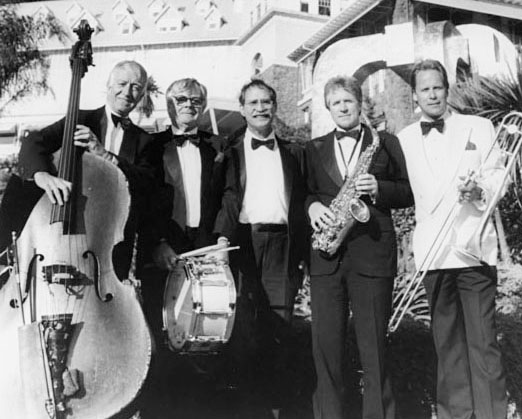
The Swing Express in 1991 at the Claremont Hotel: Dean Reilly, Dave Black, Si Perkoff, Jim Rothermel, and Rex.
“In the early 80s I was the contractor for a jazz pianist who produced a show for a local TV station. The pay was negligible, but we were told that this show was going to go world-wide. We finished taping and after a year started to expect residuals. Another year goes by and I’m travelling all over the country with my Big Band, watching television in my hotel room and seeing myself on this show. Then I start getting calls—one guy said he saw it in South Africa, another in Japan. This show went worldwide and we never got a dime. Unfortunately, the AFM couldn’t do anything because a larger television contract had never been filed by the producer. To fight it would have amounted to me getting a private attorney, tracking down who knows who, going to court—so I dropped it. I was frustrated but at least the union gave me some clarity on it. It really could have been something.”
* * *
In the 2000s Rex developed a show called America Swings Again! with writer Peter Arnott. “It’s a two-hour stage concert with a vocal group, and highly scripted. It’s nostalgic and educational. The only way it makes economic sense is when we play 2,000-seat theaters. America Swings Again! is also the name of my production company.”
Today, Rex is ‘semi-retired’. “I’m not out of the business, I’m just semi-engaged. Business is down and everyone saw it coming. But if you want to hire us, we’ll be there! If you want to send us on a 1000-city tour, we’ll leave tomorrow morning.”
Along with the many fine musicians Rex has worked with over the years, Rex would like to acknowledge these five prominent Local 6 members who were tremendously helpful in his career: Wally Wells, Norma Teagarden, Vernon Alley, Dave Black, and actor/comedian Phil Harris.
“To be paid to show up in my white dinner jacket, do what I like most to do in life, I’m incredibly lucky. I feel very, very, lucky. Yes, we make our own luck, but a lot of it is just being at the right place at the right time. There’ll always be a niche for Swing music, which was the Rock ‘n Roll of the 30s and 40s. People are no different today, and once they hear this great American sound, they’re hooked!”
Visit: www.americaswingsagain.com
